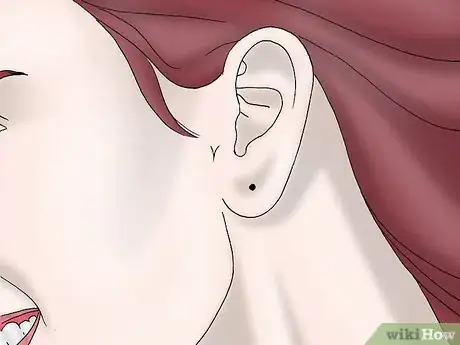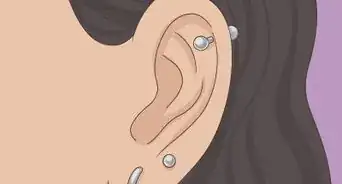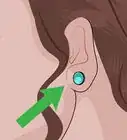This article was co-authored by Sasha Blue. Sasha Blue is a Professional Body Piercer and the Owner of 13 Bats Tattoo and Piercing Studio in the San Francisco Bay Area. Sasha has over 20 years of professional body piercing experience, starting with her apprenticeship in 1997. She is licensed with the County of San Francisco in California.
wikiHow marks an article as reader-approved once it receives enough positive feedback. This article received 44 testimonials and 89% of readers who voted found it helpful, earning it our reader-approved status.
This article has been viewed 424,190 times.
Want to get your ears pierced, but you're too scared? It may seem scary, but in fact getting your ears pierced is perfectly safe and not that painful. Knowing what to expect, thoroughly researching and planning your piercing, and coming up with ways to help yourself relax throughout the piercing will help you approach it calmly and reasonably. You'll find that you get through it safely and happily, and you'll wonder why you were so nervous to begin with!
Steps
Tips for Handling Piercing Anxiety
-
1Talk to your piercer. When you go into the piercing studio, let them know you're a little nervous. Have them walk you through the process, explain what they're doing and why, and answer any questions or worries you might have. They might offer you a comfortable chair or a glass of water. Chances are most of the people getting piercings are a little nervous, so they'll know exactly how to make you feel better.
- It might help to ask the piercer if they can pierce both of your ears at the same time so that you can get it over with faster. Know that it will be over soon, and the pain will be over.
-
2Focus on something else to take your mind off the piercing. Read a book or magazine. Gossip with your friend, or get to know your piercer a little. Chat about your weekend plans, what's going on in school, that great movie you just saw -- talk about anything but the piercing. Thinking about other things will help you calm down enough to get through the piercing.
-
3Stay positive. Focus on the best part of getting your ears pierced -- think about how you'll look with your new earrings! When it comes to the actual piercing, don't think about the pain or the stress. Instead, tell yourself that you can do it, you will get through it. If you do this enough, you'll find that it becomes true.
- Friends are great for this. Ask your friend to help you stay positive and to periodically remind you how great having your pierced ears will be.
-
4Joke about the piercing. Your friend can help you approach the piercing with a sense of humor. Laughing is a key way to reduce stress and calm you down, so whether you're laughing about the piercing itself or about an unrelated story your friend tells you, it will help you relax. Joking about the piercing will make it seem less daunting, which will help you approach it more calmly and easily.[1]
Community Q&A
-
QuestionI'm really scared to get my ears pierced. I read the comments, and it doesn't really hurt when I get shots. Is it similar to ear piercing?
 Elana VanderbiltCommunity AnswerIf you don't mind shots, ear piercing will be nothing. You can do it! It will sting a little and be really warm, but it only lasts a minute.
Elana VanderbiltCommunity AnswerIf you don't mind shots, ear piercing will be nothing. You can do it! It will sting a little and be really warm, but it only lasts a minute. -
QuestionWhat should you do if you're sensitive to pain?
 Community AnswerTry not to think about it too much and as recommended, have someone with you so you can squeeze their hand, or carry an item that you can interact with.
Community AnswerTry not to think about it too much and as recommended, have someone with you so you can squeeze their hand, or carry an item that you can interact with. -
QuestionI am 10 years old and afraid of needles. I am really frightened about getting my ears pierced. How can I feel better?
 Community AnswerTo prep a little bit, pinch your ears with your nails a few days before. That will give you an idea on how it will feel. Once you find a place that you (and your parents) are comfortable with, have the piercer walk you through the process without showing you the needles. Most piercers have you breathe in then as you breathe out they put the needle through.
Community AnswerTo prep a little bit, pinch your ears with your nails a few days before. That will give you an idea on how it will feel. Once you find a place that you (and your parents) are comfortable with, have the piercer walk you through the process without showing you the needles. Most piercers have you breathe in then as you breathe out they put the needle through.
Warnings
- There is always a risk for infection when piercing, so do your research and take precautions to keep yourself safe.⧼thumbs_response⧽
- If you're prone to getting infections or have gotten an infection in the past, ask your doctor if getting your ears pierced will put you at risk for getting another infection.⧼thumbs_response⧽
References
- ↑ https://www.mayoclinic.org/healthy-lifestyle/stress-management/in-depth/stress-relief/art-20044456
- ↑ https://healthfully.com/126594-alternatives-pierced-ears.html
- ↑ https://hudabeauty.com/10-things-need-know-get-next-piercing/
- ↑ https://www.webmd.com/skin-problems-and-treatments/how-to-pick-a-tattoo-shop
- ↑ http://www.ncsl.org/research/health/tattooing-and-body-piercing.aspx
- ↑ https://hudabeauty.com/10-things-need-know-get-next-piercing/
- ↑ https://authoritytattoo.com/getting-your-ears-pierced/
- ↑ https://authoritytattoo.com/getting-your-ears-pierced/
About This Article
Getting an ear piercing may seem scary, but you can stay calm by doing some research and learning some relaxation techniques. Before you get your piercing, look online at the risks and responsibilities that come with having a piercing and find a shop that’s approved by the Association of Professional Piercers. This way, you’ll be able to mitigate any of the risks that might be scaring you. When you have the piercing done, bring a friend or family member whose hand you can hold or talk with to keep your mind off of the piercing. Focus on breathing deeply, which will physically force your body to calm down, making the stress easier to deal with. For more help, including how to let your piercer know you’re nervous, read on.









































































